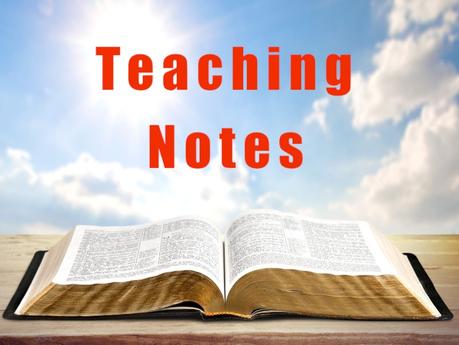Grace Thoughts
Teaching Notes: On Genesis 21

Teaching Notes are Bible studies we taught before GraceLife Ministries began publishing articles online in 1995. Some were presented as sermons, others as group studies.
Our hope is that these older studies will be a blessing to you in your life and ministry. Please use them in any way God leads you.
These teaching notes are from a series of studies about the Book of Genesis.
[These notes are from a study from 45 years ago.]
Genesis 21:1-7
And the Lord visited Sarah as he had said, and the Lorddid unto Sarah as he had spoken. For Sarah conceived, and bare Abraham a son in his old age, at the set time of which God had spoken to him. And Abraham called the name of his son that was born unto him, whom Sarah bare to him, Isaac. And Abraham circumcised his son Isaac being eight days old, as God had commanded him. And Abraham was an hundred years old, when his son Isaac was born unto him. And Sarah said, God hath made me to laugh, so that all that hear will laugh with me. And she said, Who would have said unto Abraham, that Sarah should have given children suck? for I have born him a son in his old age.
God’s grace is the important point here. He was gracious towards Sarah and kept His promise. She certainly didn’t deserve it. She had laughed at the idea of having a child earlier.
The boy was named Isaac. When he was eight days old, Abraham circumcised the boy in obedience to God’s command.
Abraham was 100 years old and Sarah was 90. This was certainly an extraordinary feat if not supernatural for such an old couple to have a child.
Sarah was super pleased. God had brought her laughter. Others would laugh with her.
Genesis 21:8-13
And the child grew, and was weaned: and Abraham made a great feast the same day that Isaac was weaned. And Sarah saw the son of Hagar the Egyptian, which she had born unto Abraham, mocking. Wherefore she said unto Abraham, Cast out this bondwoman and her son: for the son of this bondwoman shall not be heir with my son, even with Isaac. And the thing was very grievous in Abraham’s sight because of his son. And God said unto Abraham, Let it not be grievous in thy sight because of the lad, and because of thy bondwoman; in all that Sarah hath said unto thee, hearken unto her voice; for in Isaac shall thy seed be called. And also of the son of the bondwoman will I make a nation, because he is thy seed.
Isaac grew as a baby and then was weaned from his mother’s milk. Some believe this to be at one year, but others think Isaac may have been as old as three.
On the day Isaac was weaned, Abraham threw a great feast. This apparently was the custom of the day. However, Ishmael was seen mocking Isaac and Sarah told Abraham to get rid of Ishmael and Hagar. He may have been mocking the importance of Isaac or some such thing.
Abraham loved Ishmael and was distressed, but God also told him to follow Sarah’s suggestion. Because Ishmael was Abraham’s offspring too, God would make of him a nation of people.
The Apostle Paul refers to this in Galatians 4:28-31. He used the event in an exhortation to walk in the Spirit (new covenant) instead of the law (old covenant).
I believe this pictures the time in a believer’s walk when the flesh is dealt a mortal blow. It might be a facing of legalism or walking in the flesh. It might be a dealing with slavery in our walk with God. We’ve been called to a freedom in our walk, not slavery.
“It is for freedom that Christ has set us free. Stand firm, then, and do not let yourselves be burdened again by a yoke of slavery.”
Genesis 21:14-21
And Abraham rose up early in the morning, and took bread, and a bottle of water, and gave it unto Hagar, putting it on her shoulder, and the child, and sent her away: and she departed, and wandered in the wilderness of Beersheba. And the water was spent in the bottle, and she cast the child under one of the shrubs. And she went, and sat her down over against him a good way off, as it were a bow shot: for she said, Let me not see the death of the child. And she sat over against him, and lift up her voice, and wept. And God heard the voice of the lad; and the angel of God called to Hagar out of heaven, and said unto her, What aileth thee, Hagar? fear not; for God hath heard the voice of the lad where he is. Arise, lift up the lad, and hold him in thine hand; for I will make him a great nation. And God opened her eyes, and she saw a well of water; and she went, and filled the bottle with water, and gave the lad drink. And God was with the lad; and he grew, and dwelt in the wilderness, and became an archer. And he dwelt in the wilderness of Paran: and his mother took him a wife out of the land of Egypt.
The next morning Abraham sent Hagar on her way with Ishmael. I believe this follows the concept of the believer’s walk in dealing with legalism and the flesh. It is to be dealt with in a similar way. However, it will not die completely. It is still alive in each of us and must be continually acknowledged and faced.
Next, we see the compassion and purpose of God. He hears the cries of mother and child and saves them from death. He will make of Ishmael a great nation, as He promised. God opened Hagar’s eyes to see a well that would save and refresh them.
God is with this child as he grows. His descendants would become enemies of God’s chosen, but God saves and keeps them. Sometimes it is very hard to understand God’s ways. In a similar way we see that God allows our flesh to remain alive in us and continue as an enemy of our souls. Hard to understand, but definitely within His great planning.
The fact that Ishmael lived in a desert, was an archer, and married an Egyptian have interesting insights to our flesh as believers. Like Ishmael, it dwells in barren and empty places. It is the archer (shooter) of ‘fiery darts’ and is married to all that would hold us captive and in bondage.
Genesis 21:22-31
And it came to pass at that time, that Abimelech and Phichol the chief captain of his host spake unto Abraham, saying, God is with thee in all that thou doest: Now therefore swear unto me here by God that thou wilt not deal falsely with me, nor with my son, nor with my son’s son: but according to the kindness that I have done unto thee, thou shalt do unto me, and to the land wherein thou hast sojourned. And Abraham said, I will swear. And Abraham reproved Abimelech because of a well of water, which Abimelech’s servants had violently taken away. And Abimelech said, I wot not who hath done this thing; neither didst thou tell me, neither yet heard I of it, but to day. And Abraham took sheep and oxen, and gave them unto Abimelech; and both of them made a covenant. And Abraham set seven ewe lambs of the flock by themselves. And Abimelech said unto Abraham, What mean these seven ewe lambs which thou hast set by themselves? And he said, For these seven ewe lambs shalt thou take of my hand, that they may be a witness unto me, that I have digged this well. Wherefore he called that place Beersheba; because there they sware both of them.
King Abimelech and the commander of his armies, Phichol, approached Abraham and asked that he not deal falsely with them or their children or their descendants. They asked that he show them kindness as they had shown to them. Abraham swears to that.
Next, Abraham brings up a problem concerning the seizing of a well by Abimelech’s servants. Abimelech says he does not know who did this. Abraham brings sheep and cattle to Abimelech and makes a treaty between them. He takes seven ewe lambs and sets them apart as witness that he (Abraham) had dug the well. This became known as the treaty of Beersheba. The name “Beersheba” (bə’êr šāḇa‘) means “well of seven” or “well of the oath.” This may have been the well of Hagar’s salvation in 21:19.
Genesis 21:32-34
Thus they made a covenant at Beersheba: then Abimelech rose up, and Phichol the chief captain of his host, and they returned into the land of the Philistines. And Abraham planted a grove in Beersheba, and called there on the name of the Lord, the everlasting God. And Abraham sojourned in the Philistines’ land many days.
Abraham plants a “grove” (’ešel – tamarisk trees) and calls upon the name of the Lord the “everlasting God” (’êl ‘ōwlām).
After this Abraham stayed in the land of the Philistines for a long time.
The Philistines (pəlištîm) were first mentioned in Genesis 10:14. They came from the Casluhimites who came from Mizraim the son of Ham, the son of Noah. They inhabited the shore plain between Gezer and Gaza in southwestern Palestine. They play heavily into the future history of God’s people. It’s interesting that God did not move Abraham away from them (isolation).
Next Time
We will look at Genesis Chapter 22 in the next part of our special series.
[Thank you for reading these teaching notes from 45 years ago. My prayer is they will be a blessing to you and your life and ministry.]
 AbrahamBeershebaGod's Eternal PlanPalestinePhilistines
AbrahamBeershebaGod's Eternal PlanPalestinePhilistines

Published by gracelifethoughts
Founder & Director of GraceLife Ministries View all posts by gracelifethoughts
